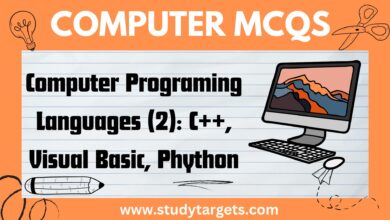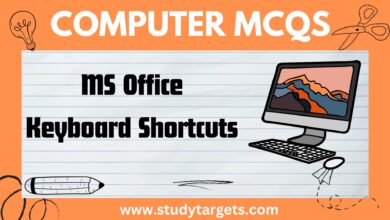MCQs: Introduction & Fundamentals of Computer :Computer MCQs

Introduction & Fundamentals of Computer
1.What is a computer?
a) A device that can perform arithmetic and logical operations
b) A device that can play video games
c) A device that can make phone calls
d) A device that can only display images
Answer: a) A device that can perform arithmetic and logical operations
2. What is the basic unit of a computer’s memory?
a) Bit
b) Byte
c) Kilobyte
d) Megabyte
Answer: a) Bit
3. Which of the following is not a type of computer?
a) Mainframe
b) Desktop
c) Tablet
d) Book
Answer: d) Book
4. Which of the following is a programming language?
a) Excel
b) C++
c) PowerPoint
d) Photoshop
Answer: b) C++
5. What does RAM stand for?
a) Random Access Memory
b) Read Access Memory
c) Reusable Access Memory
d) Recyclable Access Memory
Answer: a) Random Access Memory
6. Which of the following is not a type of storage device?
a) Hard disk drive
b) Solid-state drive
c) Compact disc
d) Mouse
Answer: d) Mouse
7. What is a CPU?
a) Central Processing Unit
b) Central Printing Unit
c) Central Power Unit
d) Central Programming Unit
Answer: a) Central Processing Unit
8. Which of the following is not a part of a CPU?
a) Arithmetic logic unit
b) Control unit
c) Input unit
d) Cache memory
Answer: c) Input unit
9. Which of the following is not a computer language?
a) HTML
b) Java
c) Python
d) C#
Answer: a) HTML
10. Which of the following is not an operating system?
a) Windows
b) MacOS
c) Linux
d) Firefox
Answer: d) Firefox
11. What is a file extension?
a) The name of a file
b) The type of data stored in a file
c) The part of a file name that follows the dot
d) The number of bytes in a file
Answer: c) The part of a file name that follows the dot
12. What is a network?
a) A group of computers that are connected and can communicate with each other
b) A group of people who use computers
c) A type of computer hardware
d) A type of computer software
Answer: a) A group of computers that are connected and can communicate with each other
13. What is the Internet?
a) A global network of networks
b) A type of computer hardware
c) A type of computer software
d) A type of computer language
Answer: a) A global network of networks
14. Which of the following is not a type of computer virus?
a) Worm
b) Trojan
c) Spyware
d) Computer worm
Answer: d) Computer worm
15. What is a firewall?
a) A program that protects a computer from viruses and other malware
b) A hardware device that connects multiple networks together
c) A program that monitors and controls incoming and outgoing network traffic
d) A type of computer storage device
Answer: c) A program that monitors and controls incoming and outgoing network traffic
16. What is encryption?
a) The process of converting plaintext into ciphertext to protect data from unauthorized access
b) The process of converting ciphertext into plaintext to read data
c) The process of deleting data from a storage device
d) The process of compressing data to reduce its size
Answer: a) The process of converting plaintext into ciphertext to protect data from unauthorized access
17. What is a URL?
a) A web page
b) A type of computer virus
c) A web address
d) A type of computer language
Answer: c) A web address
18. What is a search engine?
a) A program that searches the web for information based on keywords or phrases
b) A type of computer virus
c) A type of computer hardware
d) A program that encrypts data
Answer: a) A program that searches the web for information based on keywords or phrases
19. What is a cookie?
a) A small text file stored on a user’s computer by a website to remember user preferences
b) A type of computer virus
c) A hardware device used to store data
d) A program that creates websites
Answer: a) A small text file stored on a user’s computer by a website to remember user preferences
20. What is a domain name?
a) The part of a URL that identifies the website’s owner
b) The part of a URL that identifies the website’s location
c) The part of a URL that identifies the website’s content
d) The part of a URL that identifies the website’s design
Answer: a) The part of a URL that identifies the website’s owner
21. What is a blog?
a) A type of website that features regularly updated content in the form of posts
b) A type of computer virus
c) A type of computer hardware
d) A type of computer language
Answer: a) A type of website that features regularly updated content in the form of posts
22. What is a podcast?
a) A digital audio file that can be downloaded and listened to on a computer or mobile device
b) A type of computer virus
c) A type of computer hardware
d) A type of computer language
Answer: a) A digital audio file that can be downloaded and listened to on a computer or mobile device
23. What is cloud computing?
a) The delivery of computing services over the internet, including storage, software, and processing power
b) The delivery of computing services over the telephone network
c) The delivery of computing services over satellite
d) The delivery of computing services over a local network
Answer: a) The delivery of computing services over the internet, including storage, software, and processing power
24. What is artificial intelligence?
a) The simulation of human intelligence in machines
b) The simulation of animal intelligence in machines
c) The simulation of plant intelligence in machines
d) The simulation of extraterrestrial intelligence in machines
Answer: a) The simulation of human intelligence in machines
25. What is a computer network?
a) A group of interconnected computers and devices that can communicate and share resources
b) A type of computer virus
c) A type of computer hardware
d) A type of computer language
Answer: a) A group of interconnected computers and devices that can communicate and share resources
26. What is a LAN?
a) A local area network
b) A long-distance network
c) A wide area network
d) A virtual network
Answer: a) A local area network
27. What is a WAN?
a) A wide area network
b) A wireless area network
c) A virtual area network
d) A local area network
Answer: a) A wide area network
28. What is a router?
a) A networking device that forwards data packets between computer networks
b) A type of computer virus
c) A hardware device used to store data
d) A program that creates websites
Answer: a) A networking device that forwards data packets between computer networks
29. What is a modem?
a) A device that connects a computer to the internet through a phone line or cable line
b) A type of computer virus
c) A hardware device used to store data
d) A program that creates websites
Answer: a) A device that connects a computer to the internet through a phone line or cable line
30. What is an IP address?
a) A unique numerical identifier assigned to each device connected to the internet
b) A type of computer virus
c) A type of computer hardware
d) A program that creates websites
Answer: a) A unique numerical identifier assigned to each device connected to the internet
31. What is a protocol?
a) A set of rules and standards that define how data is transmitted and received over a network
b) A type of computer virus
c) A hardware device used to store data
d) A program that creates websites
Answer: a) A set of rules and standards that define how data is transmitted and received over a network
32. What is FTP?
a) File Transfer Protocol, a standard protocol used to transfer files over a network
b) Food Transfer Protocol, a standard protocol used to transfer food over a network
c) File Type Protocol, a standard protocol used to identify different file types
d) Firewall Transfer Protocol, a standard protocol used to transfer firewall settings over a network
Answer: a) File Transfer Protocol, a standard protocol used to transfer files over a network
33. What is HTTP?
a) Hypertext Transfer Protocol, a standard protocol used to transfer data over the web
b) Hyperlink Transfer Protocol, a standard protocol used to transfer links over the web
c) Hypertext Type Protocol, a standard protocol used to identify different types of hypertext
d) Hyperlink Type Protocol, a standard protocol used to identify different types of hyperlinks
Answer: a) Hypertext Transfer Protocol, a standard protocol used to transfer data over the web
34. What is HTML?
a) Hypertext Markup Language, a markup language used to create web pages
b) Hyperlink Markup Language, a markup language used to create hyperlinks
c) Hypertext Type Language, a programming language used to create hypertext
d) Hyperlink Type Language, a programming language used to create hyperlinks
Answer: a) Hypertext Markup Language, a markup language used to create web pages.




